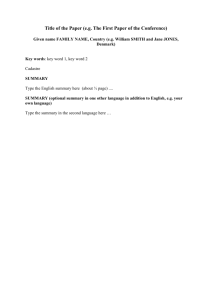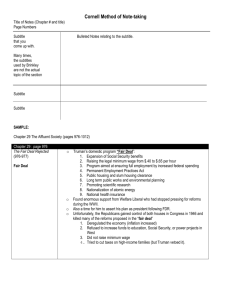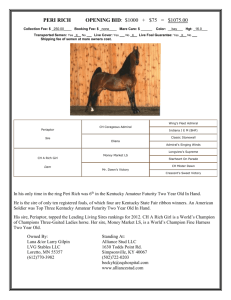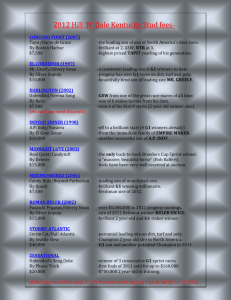Introduction to Christian Living
advertisement
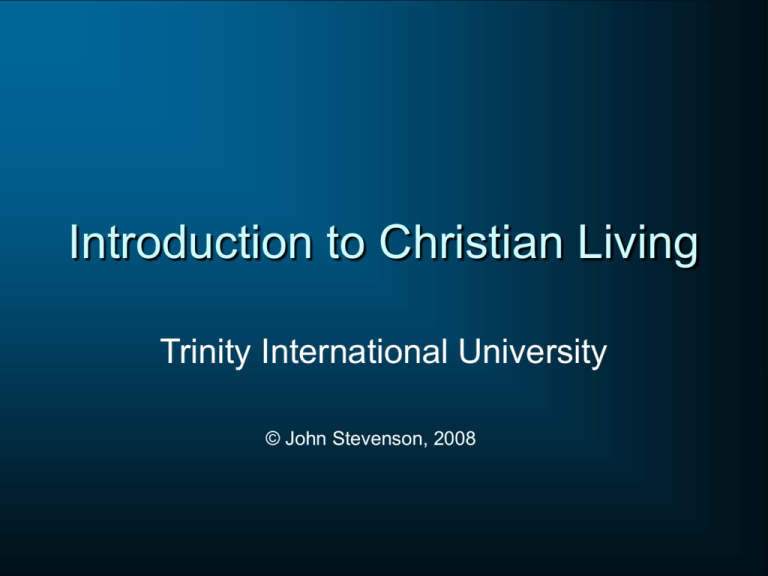
Introduction to Christian Living Trinity International University © John Stevenson, 2008 Dr. John T. Stevenson • Family Life • Academic Life Dr. John T. Stevenson • Family Life • Academic Life • Professional Life Dr. John T. Stevenson • • • • • Family Life Academic Life Professional Life Spiritual Life Ministry Life Dr. John T. Stevenson http://JohnStevenson.net JohnStevenson@Bellsouth.net Group Introductions • Your name • Your home church • What have been the highlights of your faith journey? • Where are you in the this stage of your Christian life? Syllabus Overview Introduction to Christian Living Romans 12:1-2 Therefore I urge you, brethren, by the mercies of God, to present your bodies a living and holy sacrifice, acceptable to God, which is your spiritual service of worship. 2 And do not be conformed to this world, but be transformed by the renewing of your mind, so that you may prove what the will of God is, that which is good and acceptable and perfect. Stated Negatively Stated Positively Do not be conformed to this world Be transformed by the renewing of your mind Course Objectives • Reflect on the value of the mind for a Christian and what it means to think Christianly • Discover and understand what is a world view • Define your own personal world view • Understand what the essential elements of a biblical Christian world view are Course Objectives • Integrate the biblical Christian world view into all areas of life • Discern world views in circumstances of life, especially in popular culture and the media • Live the Christian faith Textbooks • Phillips, Timothy and Dennis Okholm. A Family of Faith: An Introduction to Evangelical Christianity. (Revised Edition) Grand Rapids, MI: Baker Books, 2001. Spiritual Disciplines for the Christian Life. Donald S. Whitney, NavPress, 1991 • Romanowski, William. Eyes Wide Open: Looking for God in Popular Culture. Grand Rapids, MI: Brazos Press, 2007. Textbooks • • Cornelius Plantinga, Jr. Engaging God’s World: A Christian Vision of Faith, Learning and Living. Eerdmans, 2002. Student Manual for CM 446R, EXCEL. Available through www.tiu.edu/EXCEL/manuals Course Requirements • • • • • Class Discussion Assigned Readings Homework Assignments Group Project Applied Learning Paper Assignments • Papers normally due at the beginning of each class session • Final Paper due one week after Session Five – 10 to 12 pages – Typed & double spaced (APA formatting) – Can be handed in manually or Emailed – If it is Emailed, use Word, Wordperfect or pdf • Attendance Policy Grades Homework Questions 50 pts Class participation 50 pts Group Project 50 pts Applied Learning Paper 50 pts Total Grade 200 pts Attendance Policy • Attendance required to all classes • Group participation counts for 25% of the final grade • Missing a single class automatically lowers up to a final grade by one letter • Missing more than a single class results in an “F” Group Formation Group 1 Group 2 – – – – – – Group 3 Calvin Graham Kelvin Murray Gregory Willocks Rosa Duran Carmen Landa Rachael Riley Evil Death and Dying Group Faith and Reason Topics Gender roles Old Age Progress Feminism Individualism Consumer Culture Religion and Politics Racial Integration Crime and Violence Justice (economic or criminal) Victimhood & Personal Responsibility Individual vs. Community An Introduction to World View Paradigms and Perspectives What is a World View? A window to the world The glasses through which we see Four Basic Questions • What is real? Timothy Phillips & Sennis Okholm Page 27 – What is the nature of ultimate reality? – Is this universe all there is? – Is this physical universe an illusion? – Who or what is God? Four Basic Questions • What is real? • Who am I? Timothy Phillips & Sennis Okholm Page 27 – What does it mean to be human? – What is the purpose of human existence? – What are we doing here? Four Basic Questions • What is real? • Who am I? • What is wrong? Timothy Phillips & Sennis Okholm Page 27 – What is the origin of suffering and evil? – Why do we die? – What keeps humans from utopia? Four Basic Questions • • • • Timothy Phillips & Sennis Okholm Page 27 What is real? Who am I? What is wrong? What is the solution? – How does one remedy this problem? – How does one attain “salvation”? James Sire • Outlines basic worldviews that underlie the way we think • Traces historically how these worldviews developed • Understand ourselves and others so we can genuinely communicate www.home.snu.edu/~HCULBERT/ppt.htm “A worldview is a set of presuppositions (or assumptions) which we hold (consciously or subconsciously) about the basic makeup of our world.” ― James W. Sire, The Universe Next Door (Downers Grove, Ill.: InterVarsity, 1988), 17. Most of your World View lies under the surface and is not immediately obvious What a World View Does One’s worldview determines how the events and circumstances of life will be… • Understood • Accepted • Acted upon Sire’s Seven Questions • What is prime reality? • What is the nature of external reality, the world around us? • What is a human being? • What happens at death? • Why is it possible to know anything? • How do we know what is right and wrong? • What is meaning of human history? How important are religious beliefs to one’s world view? “Theology is not simply a system of beliefs to be added alongside the others. Theology is the master blueprint on which all other blueprints are mapped” -- Paul Hiebert, missionary anthropologist Questions that inform all world views • • • • Definition: What is it? Purpose: Why is it here? Direction: Where is it going? Application: What should we do about it? Naturalism Subtitle: The silence of finite space • Secular Humanism • God is removed; the universe was selfactivating • Human personality is only an interrelation of chemical properties • Values are man-made “The cosmos is all that is and all that was and all that ever will be.” ― Carl Sagan C.S. Lewis in his book Miracles… Naturalism is selfrefuting because it is inconsistent with the validity of reasoning. Nihilism Sire’s subtitle: Zero point B.F. Skinner • Extreme pessimism / skepticism • Nothing has meaning, value, significance, dignity or worth • Human beings are conscious machines with no ability to effect their destiny • Human animal only invents values Existentialism Subtitle: Beyond Nihilism Jean-Paul Sartre • Humanity is central: people make themselves who they are • Knowledge is subjective • No absolute moral values • History is uncertain and even unimportant • Supernatural is brushed aside Existentialism Atheistic Theistic Existentialism Subtitle: Beyond Nihilism Paul Tillich Even the theistic version says that the Bible, though “religiously true,” is historically untrustworthy. Eastern Pantheism • Many (if not all) roads lead to the One • Ideas are not really important • Time is unreal • History is cyclical • Desire to enter the undifferentiated One; in one sense, each person is God New Age Sire’s subtitle: A separate universe • “Core” experience is cosmic consciousness • No personal God; only a mysterious Force; no Lord of the Universe unless it be us • Borrows heavily from animism “May the force be with you” ― Yoda The Circle of Life Postmodernism Sire’s subtitle: The vanished horizon • All stories equally valid • Focus changes from being to knowing • Paradoxically, reality is forever hidden • Any story but my own is oppressive • Social good = whatever society takes it to be at the moment Postmodernism Sire’s subtitle: The vanished horizon • The postmodernist stares blankly at any claims to truth and shrugs: “Okay if it works for you.” • “There are many kinds of truths and consequently, there is no truth” – Nietzsche • Instead of “the truth shall make you free,” postmodernism claims that “freedom shall make you true.” Wayne Stayskal, Tampa Tribune Postmodernists and Truth • “Truth is what one’s peers let one get away with” -- Richard Rorty • “Postmodern ethics inevitably slides in the direction of nihilism, holding that since nothing is really true, nothing is necessarily good” -- Gerard Reed “Reality is that which, when you stop believing in it, doesn’t go away.” - Philip Dick (19281982) Deism Sire’s subtitle: The clockwork universe • God – Is Distant • an intellect to be recognized • not a person to be worshipped – Is an architect, not a lover or a judge • The Cosmos is not fallen or abnormal Voltaire The Cosmos in Deism • A closed, linear, cause and effect system • A clockwork universe that God allowed to run on its own • God, as the first cause, never intervenes • Miracles do not happen Voltaire Christian Theism Sire’s subtitle: A world charged with the grandeur of God Knowledge, death, reality, ethics, history, and the realness of human beings are all focused on God. Matthew 6:24 No one can serve two masters; for either he will hate the one and love the other, or he will be devoted to one and despise the other. You cannot serve God and wealth. How is one’s world view impacted if he attempts to serve two masters? What is the impact of taking a “double vision” approach to life?

